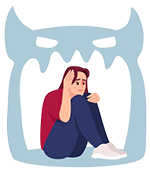8:00 a.m -6:00 p.m
-
-
-
RMZ Ecoworld, Bellandur, Outer Ring Road
8:00 a.m -6:00 p.m
RMZ Ecoworld, Bellandur, Outer Ring Road
According to NIMH ( National Institute of Mental Health)
Females are more likely to be affected by anxiety disorders than males.
The 18–29 age group has the highest prevalence of anxiety disorders.
Adolescents who have experienced a stressful event in the past year are more likely to be affected by anxiety disorders.
18.1% or 40 million
Adults of the population in India is affected by Anxiety Disorders

Most of the time people use it interchangeably.
Worry is the thinking part of anxiety- Related mostly to thoughts.
Worry is mostly about future events or the unknown and is rooted in the thinking part of our brain the pre frontal cortex.
Worry can be functional, but when it gets compulsive, distorted or fear based repetition then it can develop into anxiety or depressive disorders.

Stress is the physiological reaction to stress.
Stress is what is going on inside our bodies- FFF Response, rooted in the reptilian brain and is involuntary. Survival state. Pumps out Adrenaline to increase performance.
Unresolved stress, it comes in things that are not really threatening, or if it becomes chronic then it can have detrimental effects on the body.
Chronic Stress- Heart disease, High BP, and frequent illnesses.

Anxiety is the intersection of Stress and Worry. It is felt with the activation of the Limbic brain. Feeling and option. It makes people watch out for dangers but when it dominates our life it becomes difficult to relax or feel joy or make value based choices.
First step to management is awareness-
Begin to notice when you feel anxiety.
Explore and describe the two different aspects of it.
Where does anxiety show up as stress in your body?
What does it feel like and how does it show up as thoughts?
What do the thoughts sound like?
